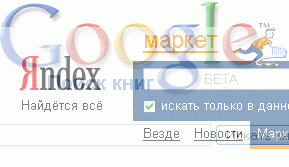Look for books like you want
 For two weeks now, how curious users of the RuNet can observe a fully Russian-language search service for books from Google . However, the general public remains unaware of Google’s official announcement. In the meantime, there is already something to see and what to tell. In addition, Google’s initiative did not go unnoticed at Yandex, which last week began to offer Market users a card with a description and output of the books presented there. What, in turn, did not fail to declare publicly.
For two weeks now, how curious users of the RuNet can observe a fully Russian-language search service for books from Google . However, the general public remains unaware of Google’s official announcement. In the meantime, there is already something to see and what to tell. In addition, Google’s initiative did not go unnoticed at Yandex, which last week began to offer Market users a card with a description and output of the books presented there. What, in turn, did not fail to declare publicly.Let's take a closer look at what the search giants offer to book lovers. Let's start with Google.
California company offers us its traditional approach. Entering the name of the book in the usual search bar, we get ... well, what we get is highly dependent on many factors. Mostly so far from where the book was published. If this is a popular edition in the US (as an example from the service certificate - America’s best-selling Fast Food Nation ), then we’ll see a book card with comprehensive (and even slightly redundant) information on the book. If this is a product of the domestic publishing industry, today we are likely to see such a card, like in all respects the wonderful “ Adventures of Sherlock Holmes ”, the publisher of which simply has not bothered to compile a description of the book for the service.
In general, work with publishers has so far limited itself to obtaining permission from them to publish excerpts from books (or entire books) and, in rare cases, images of a book cover. Editions of some large IDs are indexed only because they are in the archives of libraries of foreign universities participating in a special affiliate program, which is why in the search results there are very often references to names written in terrible transliteration.
')
Due to the modest size of the index, references to other versions of the book’s publication and similar works are not being shown yet. The key words of the text are obviously chosen using a rather simple algorithm that chooses the highest-frequency names and names, as well as the terms found in this book more often than in the "average". The result, however, is far from human logic.
Not yet organized work with online book stores runet - almost all books are encouraged to search only on the shelves of Western monsters like Amazon and Barnes & Noble, where they are of course very often not found. However, contextual advertising AdWords is already smartly spun for every page of the book, and quite relevant. This is especially noticeable for non-fiction books.
The publishing house Mann, Ivanov and Ferber is so far one of the few with whom Google began to work. Its commercial director, Artyom Stepanov, told us that the benefits of cooperation for the publishing house are so far indirect: theoretically improved awareness among the audience due to the fact that users of the search book often come across. Google’s profit is not yet shared by advertising, and until the links to Runet’s stores are closed, the direct channel for converting advertising into sales is closed.
In general, looking at the western counterpart, the service can predict a fairly successful future. Moreover, according to experts, by 2010 every tenth book in Russia will be sold over the Internet. Against this background, convenient search tools become really important.
However, on the road to success in Russia, Google Books will have to contend with ... yes, yes, with Yandex. Cards with book descriptions that already work on Yandex.Market, with the ability to search by author / title and unique ISBN identifier, are inferior to Google only because they lack the ability to look into the text of a book. However, by annotation (I could not find a book without one), links to several domestic stores, rating, reviews and, finally, the average price, you can get a fairly complete picture of almost any upcoming purchase. In addition, the base of indexed publications has already "hundreds of thousands" of titles.
Source: https://habr.com/ru/post/21269/
All Articles